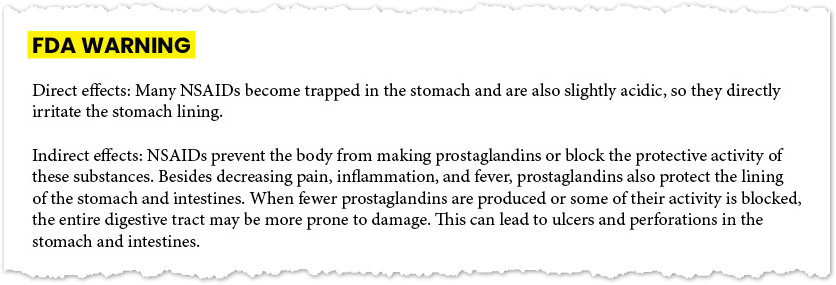NSAIDs block the normal ability of the body to heal and repair soft tissues (muscle, tendons and ligaments) and bones.
Non-steroidal anti-inflammatory drugs (or NSAIDs – man, no wonder we abbreviate that mess!) are the most commonly used drugs in the world, both prescription and over the counter.
And I don’t just mean for people.
Our dogs are being exposed to dangerous drugs. And not by accident. These pain meds for dogs are becoming a major problem.
Non-steroidal Anti-inflammatory Drugs
Many people reach for NSAIDs as a first choice when it comes to relieving their pets (or themselves) of any pain. While many people believe these medications are very safe and effective, recent statistics suggest otherwise.
In the US alone, NSAIDs cause:
- 120,000 hospitalizations per year, at an average cost of $15,000 – $20,000 each (that’s a total of $2 billion per year)
- 16,500 deaths per year (directly related to prescription-only NSAIDs. The number would be much higher if it included deaths from over-the-counter use)
- Gastrointestinal (GI) or other complications in 2% (1.2 million) of the 60 million Americans who use NSAIDs regularly
- The most common cause of death from NSAIDs is GI bleeding, with liver and/or kidney failure the next most common
So, five times as many people die from NSAIDs yearly compared to all the people killed in the World Trade Center attacks. Why isn’t anyone upset about this?
Similar stats are not available for dogs. However, with so many calls to poison control centers and visits to emergency clinics directly related to NSAID ingestion, both intentional and accidental, it’s hard to believe that dogs are not affected.
There are currently about 20 different NSAIDs labeled for as pain meds for dogs. They’re made by various pharmaceutical companies, and all of them warn of potential major side effects. That alone should be cause for concern.
The FDA has also issued warnings about NSAID use:


Why Not NSAIDs?
There are many good reasons to avoid NSAIDs. Yes, these drugs may decrease pain in the short-term. On the other hand, they block the normal ability of the body to heal and repair soft tissues (muscle, tendons and ligaments) and bones.
For example, The Rotterdam Study released in 2005 showed increased joint damage in humans over time. Participants were three times more affected compared to those not using NSAIDs. Another found a 50% increase in hip replacements in people using NSAIDs for two years or more. A third study found that those using NSAIDs were at risk for an acceleration of articular cartilage breakdown.
Are the long-term effects of NSAIDs worth the short-term gains of slight pain relief for our dogs?
Maybe it seems like an easy thing for me to just say “ditch the NSAIDs,” but I come to you with personal experience. I once relied heavily on NSAIDs to get through the day. I was suffering from ruptured discs in my neck and two torn cruciate ligaments with degenerative arthritis. I eventually reached a point where 800mg of ibuprofen three times a day didn’t even touch the pain. Converting to homeopathy and other alternative treatments saved me from a not-so-bright future of endless pain and hopelessness. And you can give that same relief to your dog.
The Homeopathic Option For Pain Relief
Homeopathy offers a much more natural way of dealing with your dog’s pain, whether it’s due to an injury or other painful condition.
Homeopathy offers a much more natural way of dealing with your dog’s pain, whether it’s due to an injury or other painful condition.
Remember, we’re not treating a diagnosis, we’re treating a whole animal. By looking at the whole picture and taking the holistic route, many dogs recover completely. They can live happily without constant drug treatment. By treating your animal as a whole, and including past and present symptoms in the process, you can increase the overall health picture, including pain relief.
When I recommend a holistic remedy for an animal in some kind of pain, my clients often ask “But what about the pain? Should I just give baby aspirin?” While I can see where this question comes from, it’s a common misconception of homeopathy. I explain that the correct remedy will kick-start an amazing healing response in the animal. This includes excellent pain relief. This means there’s no need to add any other drugs to the mix!
Altered States
If we’re talking about looking at the whole picture, it only makes sense to talk about one of the key reasons to avoid pain meds for dogs. This is especially true if you’re trying to cure your dog using homeopathy. NSAIDs can have a clouding effect that makes it tough to see the true picture of any disorder. This can also mask important symptoms or modalities.
Modalities refer to things that make symptoms better or worse, such as movement, rest, heat or cold. Without this important information, it’s harder to see exactly what’s going on with your dog. This makes it tough for your holistic vet or homeopath to choose the right remedy for the case. What’s even worse is that the symptoms may be totally suppressed by the drugs. In this case we have to decrease or stop the drugs altogether to get to the true underlying situation. If you can’t see the full picture, how can you possibly fix what’s wrong?
Homeopathy Helping Real Orthopedic Cases
If I could offer one take-home message, it would be that using NSAIDs slows healing and speeds up joint damage. Homeopathy offers a superior long-term solution, with greater safety and effect.














